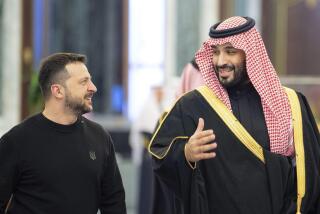Bush and Saudis Fail to Agree on Oil Price Policy
MANAMA, Bahrain — Vice President George Bush said Monday that the United States and Saudi Arabia found no “common solution” on stabilizing the volatile oil market during three days of talks.
He also said the two countries disagree about what oil price level is desirable. From the Saudi standpoint, “the stronger the price for international oil, the better. . . . That does not coincide with the best interest of the United States,” Bush told a news conference in Dhahran, Saudi Arabia.
However, Bush said it is not the role of the United States “to dictate to countries around the world what the price of oil should be.”
Meanwhile, traders in London and New York bid up the price of crude oil on futures markets by well over $1 a barrel.
Later in the day, Bush flew to Bahrain on the second leg of a Middle East visit that includes Oman and North Yemen. He was greeted by Sheik Isa ibn Salman al Khalifa, the ruler of this cluster of islands in the Persian Gulf.
Bush discussed security and economic issues into the early morning Monday with Saudi King Fahd at his summer palace in Dhahran.
Discussing the different U.S. and Saudi viewpoints on oil prices, Bush said: “The best way to sort it out is (the) market. So we have not gone in there to fix prices or discuss levels of pricing. I was not sent here on a price-fixing mission.”
Asked if there was any common ground for stabilizing the sharply fluctuating market, Bush said: “Not really. I hope there’s a better understanding on their part. . . . Certainly there wasn’t any common solution found.”
Oil is a major topic of Bush’s trip. Last week, he said national security interests would be threatened by low prices that weakened U.S. producers and energy financiers.
Since November, prices have plummeted as a flood of oil, much of it from Saudi Arabia, has inundated the market.
“We don’t have a plan for stabilizing prices,” Bush said. “We want to see what comes out of the OPEC meeting” slated to start April 15.
The meeting was scheduled after oil ministers from the 13-member Organization of Petroleum Exporting Countries failed last month to agree to reduce output to reverse the oil market decline.
Bush said that while the Saudis have at least doubled production since the summer, their output is far below the level of 10 million to 11 million barrels a day of several years ago.
“It seems difficult to me to blame one country whose production is historically down when others have raised their production even though one country (Saudi Arabia) is the dominant producer in OPEC,” Bush said.
He said of his meetings in Saudi Arabia that “we didn’t go in there trying to lean on somebody to do one thing or another. We believe that market (forces) can (work) even though the market is imperfect when you have OPEC.”
Bush declined to name a specific price at which the market would be considered stable.
More to Read
Sign up for Essential California
The most important California stories and recommendations in your inbox every morning.
You may occasionally receive promotional content from the Los Angeles Times.










